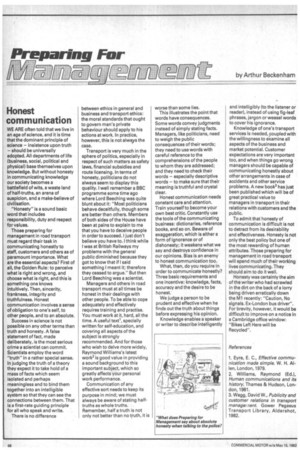Preparing For
Page 62

If you've noticed an error in this article please click here to report it so we can fix it.
Honest communication
WE ARE often told that we live in an age of science, and it is time that the dominant principle of science — insistence upon truth — should be universally
adopted. All departments of life (business, social, political and physical) base themselves upon knowledge. But without honesty in communicating knowledge our society becomes a battlefield of wits, a waste land of half-truths, an arena of suspicion, and a make-believe of civilisation.
"Honesty" is a sound basic word that includes responsibility, duty and respect for values.
Those preparing for management in road transport must regard their task in communicating honestly to staff, customers and others as of paramount importance. What are the essential aspects? First of all, the Golden Rule: to perceive what is right and wrong, and choose what is right, and this is something one knows intuitively. Then, sincerity, frankness, integrity and truthfulness. Honest communication involves a sense of obligation to one's self, to other people, and to an absolute.
Success in science is not possible on any other terms than truth and honesty. A false statement of fact, made deliberately, is the most serious crime a scientist can commit. Scientists employ the word "truth" in a rather special sense. In judging the truth of a theory they expect it to take hold of a mass of facts which seem isolated and perhaps meaningless and to bind them together into an intelligible system so that they can see the connections between them. That is a first-rate guiding principle for all who speak and write.
There is no difference between ethics in general and business and transport ethics: the moral standards that ought to govern man's private behaviour should apply to his actions at work. In practice, however, this is not always the case.
Transport is very much in the sphere of politics, especially in respect of such matters as safety laws, financial subsidies and route licensing. In terms of honesty, politicians do not always seem to display this quality. !well remember a BBC programme some time ago where Lord Beeching was quite blunt about it: "Most politicians behave deceitfully, though some are better than others. Members of both sides of the House have been at pains to explain to ma that you have to deceive people in order to succeed.1 just don't believe you have to. I think while I was at British Railways my problems with the general public diminished because they got to know that if I said something I meant it; therefore they ceased to argue." But then Lord Beeching was a scientist.
Managers and others in road transport must at all times be honest in their dealings with other people. To be able to cope adequately and effectively requires training and practise. You must work at it, hard, all the time. A useful text', specially written for self-education, and covering all aspects of the subject is strongly recommended. And for those who wish to delve more widely, Raymond Williams's latest work2 is good value in providing a sound background to this important subject, which so greatly affects your personal work performance.
Communication of any effective sort needs to keep its purpose in mind; we must always be aware of stating ha Iftruths as whole truths. Remember, half a truth is not only not better than no truth, it is
worse than some lies.
This illustrates the point that words have consequences. Some words convey judgments instead of simply stating facts. Managers, like politicians, need to weigh the public consequences of their words; they need to use words with careful reference to the comprehensions of the people to whom they are addressed; and they need to check their words — especially descriptive words — to make sure that their meaning is truthful and crystal clear.
Honest communication needs constant care and attention. Train yourself to become your own best critic. Constantly use the tools of the communicating business: dictionaries, reference books, and so on. Beware of exaggeration, which is either a form of ignorance or of dishonesty; it weakens what we say and destroys confidence in our opinions. Bias is an enemy to honest communication too.
What, then, do you require in order to communicate honestly? Three basic requirements and one incentive: knowledge, facts, accuracy and the desire to be honest.
We judge a person to be prudent and effective when he finds out the truth about things before expressing his opinion.
Knowledge enables a speaker or writer to describe intelligently and intelligibly (to the listener or reader), instead of using fig-leaf phrases, jargon or weasel words to cover his ignorance.
Knowledge of one's transport services is needed, coupled with the willingness to examine all aspects of the business and market potential. Customer expectations are very important too, and when things go wrong managers should be capable of communicating honestly about other arrangements in case of accidents and other service problems. A new book3 has just been published which will be of great practical value to managers in transport in their relations with customers and the public.
To admit that honesty of communication is difficult is not to detract from its desirability and effectiveness. Honesty is not only the best policy but one of the most rewarding of human attributes. Those preparing for management in road transport will spend much of their working lives communicating. They should aim to do it well.
Honesty was certainly the aim of the writer who had scrawled in the dirt on the back of a lorry being driven erratically down the M1 recently: "Caution, No signals. Ex-London bus driver". For brevity, however, it would be difficult to improve on a notice in a Cambridge office window: "Bikes Left Here will be Recycled".
















































































